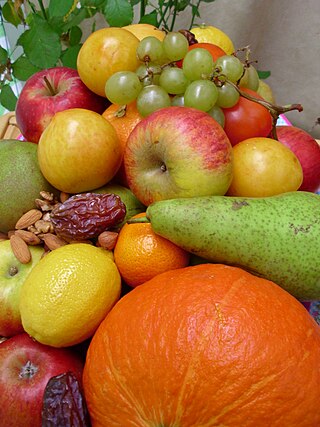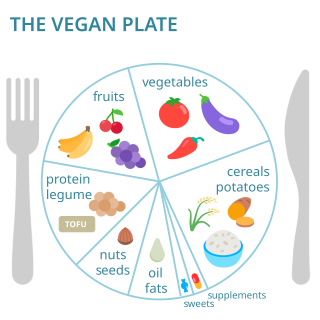Related Research Articles
Dieting is the practice of eating food in a regulated way to decrease, maintain, or increase body weight, or to prevent and treat diseases such as diabetes and obesity. As weight loss depends on calorie intake, different kinds of calorie-reduced diets, such as those emphasising particular macronutrients, have been shown to be no more effective than one another. As weight regain is common, diet success is best predicted by long-term adherence. Regardless, the outcome of a diet can vary widely depending on the individual.

Fruitarianism is a diet that consists primarily of consuming fruits and possibly nuts and seeds, but without any animal products. Fruitarian diets are subject to criticism and health concerns.

Human nutrition deals with the provision of essential nutrients in food that are necessary to support human life and good health. Poor nutrition is a chronic problem often linked to poverty, food security, or a poor understanding of nutritional requirements. Malnutrition and its consequences are large contributors to deaths, physical deformities, and disabilities worldwide. Good nutrition is necessary for children to grow physically and mentally, and for normal human biological development.

Malnutrition occurs when an organism gets too few or too many nutrients, resulting in health problems. Specifically, it is "a deficiency, excess, or imbalance of energy, protein and other nutrients" which adversely affects the body's tissues and form. Malnutrition is not receiving the correct amount of nutrition. Malnutrition is increasing in children under the age of five due to providers who cannot afford or do not have access to adequate nutrition.

Weight loss, in the context of medicine, health, or physical fitness, refers to a reduction of the total body mass, by a mean loss of fluid, body fat, or lean mass. Weight loss can either occur unintentionally because of malnourishment or an underlying disease, or from a conscious effort to improve an actual or perceived overweight or obese state. "Unexplained" weight loss that is not caused by reduction in calorific intake or increase in exercise is called cachexia and may be a symptom of a serious medical condition.

In nutrition, diet is the sum of food consumed by a person or other organism. The word diet often implies the use of specific intake of nutrition for health or weight-management reasons. Although humans are omnivores, each culture and each person holds some food preferences or some food taboos. This may be due to personal tastes or ethical reasons. Individual dietary choices may be more or less healthy.
Micronutrients are essential dietary elements required by organisms in varying quantities to regulate physiological functions of cells and organs. Micronutrients support the health of organisms throughout life.

A healthy diet is a diet that maintains or improves overall health. A healthy diet provides the body with essential nutrition: fluid, macronutrients such as protein, micronutrients such as vitamins, and adequate fibre and food energy.
Nutritional genomics, also known as nutrigenomics, is a science studying the relationship between human genome, human nutrition and health. People in the field work toward developing an understanding of how the whole body responds to a food via systems biology, as well as single gene/single food compound relationships. Nutritional genomics or Nutrigenomics is the relation between food and inherited genes, it was first expressed in 2001.
Nutritional science is the science that studies the physiological process of nutrition, interpreting the nutrients and other substances in food in relation to maintenance, growth, reproduction, health and disease of an organism.

Walter C. Willett is an American physician and nutrition researcher. He is the Fredrick John Stare Professor of Epidemiology and Nutrition at the Harvard School of Public Health and was the chair of its department of nutrition from 1991 to 2017. He is also a professor of medicine at Harvard Medical School.

Bad Astronomy: Misconceptions and Misuses Revealed, from Astrology to the Moon Landing "Hoax" is a non-fiction book by the American astronomer Phil Plait, who is also known as "the Bad Astronomer". The book was published in 2002 and deals with various misunderstandings about space and astronomy, such as sounds being audible in space.
Health is the state of complete physical, mental, and social well-being and a positive concept emphasizing social and personal resources, as well as physical capacities. This article lists major topics related to personal health.

Vegan nutrition refers to the nutritional and human health aspects of vegan diets. A well-planned, balanced vegan diet is suitable to meet all recommendations for nutrients in every stage of human life. Vegan diets tend to be higher in dietary fiber, magnesium, folic acid, vitamin C, vitamin E, iron, and phytochemicals; and lower in calories, saturated fat, cholesterol, long-chain omega-3 fatty acids, vitamin D, calcium, zinc, and vitamin B12.
The Wiley Bad Science Series is a series of books by John Wiley & Sons Publishing about scientific misconceptions.
Dariush Mozaffarian is a cardiologist, Jean Mayer Professor at the Friedman School of Nutrition Science and Policy at Tufts University, Professor of Medicine at Tufts School of Medicine, and an attending physician at Tufts Medical Center. His work aims to create the science and translation for a food system that is nutritious, equitable, and sustainable. Dr. Mozaffarian has authored more than 500 scientific publications on dietary priorities for obesity, diabetes, and cardiovascular diseases, and on evidence-based policy approaches and innovations to reduce diet-related diseases and improve health equity in the US and globally. Some of his areas of interest include healthy diet patterns, nutritional biomarkers, Food is Medicine interventions in healthcare, nutrition innovation and entrepreneurship, and food policy. He is one of the top cited researchers in medicine globally, he has served in numerous advisory roles, and his work has been featured in an array of media outlets.
The Immune Power Diet is a pseudoscientific elimination diet promoted by physician Stuart M. Berger (1953–1993). The diet was based on the false idea that many people have hidden food allergies and that by eliminating certain foods and taking dietary supplements the body's immune system would be strengthened.

Douglas Chalmers Watson M.D., F.R.C.P.Ed. was a Scottish physician and writer.
Catherine Alison Geissler, Lady Auld is a prominent British nutritionist and author and co-author of widely recognised reference textbooks on human nutrition.
References
- ↑ Wanjek, Christopher. "Profile". christopherwanjek.com. Retrieved 28 September 2014.
- ↑ Wanjek, Christopher (2003). Bad Medicine: Misconceptions and Misuses Revealed, from Distance Healing to Vitamin O (eBook). John Wiley & Sons. ISBN 978-0-471-46315-3.
- ↑ Wanjek, Christopher (2020). Spacefarers: How Humans Will Settle the Moon, Mars, and Beyond. Harvard University Press. ISBN 9780674984486.
- ↑ Wanjek, Christopher (2005). Food at Work: Workplace Solutions for Malnutrition, Obesity and Chronic Diseases. International Labour Organization. ISBN 978-92-2-117015-0.
- ↑ "Estudio marca la importancia de la buena alimentación para trabajadores" [Study marks the importance of good nutrition for workers] (in Spanish). La Red 21. 26 October 2008. Retrieved 13 October 2018.
- ↑ Atwal, Preetpal (2007). "Food at work". Journal of Human Nutrition and Dietetics. 20 (1): 51. doi:10.1111/j.1365-277X.2007.00738.x.
- ↑ Occupational Medicine (56): 69–71. 2006.
{{cite journal}}: Missing or empty|title=(help) - ↑ Journal of Human Nutrition and Dietetics. 63 (2): 128. 2006.
{{cite journal}}: Missing or empty|title=(help) - ↑ "Aumenta número de diabéticos en México" [Increased number of diabetics in Mexico]. El Universal (in Spanish). 18 April 2008. Archived from the original on 4 October 2012. Retrieved 28 September 2014.
- ↑ Šimienė, Dalia (24 April 2007). "Seime rengiama konferencija 'Naujas požiūris į darbuotojų mitybą darbe'" (in Lithuanian). ELTA. Archived from the original on 4 March 2016. Retrieved 29 September 2014.
- ↑ Pozzi, Diputado Jorge (October 2008). "La alimentación de los trabajadores..." [Feeding the workers...]. Nuevo Espacio. Archived from the original on 18 February 2012. Retrieved 30 July 2009.
- ↑ "Inside the January 2007 Issue". skyandtelescope.com. 1 January 2007. Retrieved 29 September 2014.
- ↑ "Search Results: "christopher wanjek"". The Washington Post . Retrieved 29 September 2014.
- ↑ Wanjek, Christopher (31 March 2009). "Pope's Condom Condemnation Distorts Truth". LiveScience . Retrieved 29 September 2014.
- ↑ Wanjek, Christopher. "Jokes Submitted to The Tonight Show with Jay Leno". christopherwanjek.com. Archived from the original on 11 September 2013. Retrieved 29 September 2014.